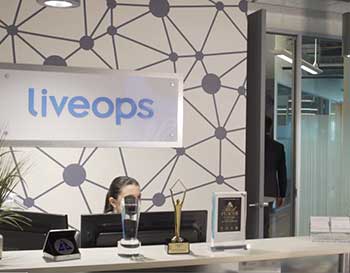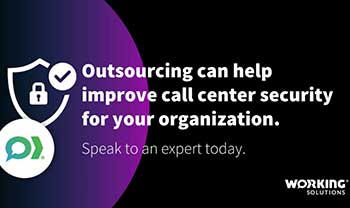Working from home is becoming increasingly popular these days. It allows for greater flexibility, no commute, and the comfort of your own home. Two major companies in the remote customer service industry are LiveOps and Working Solutions.
But which one is better for work-from-home agents? Here’s an in-depth comparison of LiveOps Vs. Working Solutions to help you decide.
A Brief Comparison Table
| Feature | LiveOps | Working Solutions |
| Pay Structure | Pay per talk time ($9-$15/hr avg) | Hourly pay rate ($10/hr guaranteed) |
| Employee Classification | Independent contractor (1099) | W2 employee |
| Schedule Flexibility | Flexible self-paced hours | Set schedules and shifts |
| Training | Initial certification training | 5 weeks extensive training |
| Client Base | Mainly large corporations | Wider variety of clients |
| Work Acquisition | Agents apply for programs based on skills and interests | Accounts assigned based on agent’s background |
Overview Of LiveOps
LiveOps has been around since 2001 and is one of the largest virtual call center networks. They operate an online cloud contact center and provide customer service, sales, and technical support solutions for many large corporations.

Some key facts about LiveOps:
- Over 20,000 home-based agents
- Flexible self-paced hours from your home office
- Hourly pay ranging from $9-$15 per hour
- Independent contractor positions (1099)
- Must complete initial training and certification
LiveOps agents handle inbound sales and service calls for clients. There is flexibility in choosing your own hours and schedule. Pay is per talk time only, not counting hold time or between calls. LiveOps provides the necessary equipment and handles client acquisition and program management.
Overview Of Working Solutions
Working Solutions specializes in home-based call center outsourcing and was founded in 1996. They also deal with large corporate clients across various industries.
Key facts about Working Solutions:
- Over 30,000 home agents since inception
- Scheduled hourly shifts with set schedules
- Pay rate of $10 per hour guaranteed
- W2 employees with benefits
- Extensive 5 week training program
Working Solutions agents work scheduled shifts handling customer service, sales, and technical support calls. Pay is based on total hourly time logged in and out of the phone system. W2 employment status provides benefits like health insurance and paid time off.
Now let’s compare some of the key differences between the two companies:
LiveOps Vs. Working Solutions: Key Feature Comparison
Pay Structure

- LiveOps – Pay per talk time only (approx $9-$15/hr)
- Working Solutions – Hourly pay rate ($10/hr guaranteed)
LiveOps pays per minute spent talking on calls, whereas Working Solutions pays an hourly rate. For LiveOps, time spent waiting between calls or navigating systems does not count as paid time.
Employee Classification
- LiveOps – Independent contractors (1099)
- Working Solutions – W2 employees
LiveOps agents are independent contractors so they are responsible for their own taxes and benefits. Working Solutions classifies agents as employees and provides health insurance and PTO.
Schedule Flexibility
- LiveOps – Flexible self-paced hours
- Working Solutions – Set schedules and shifts
One of the biggest perks of LiveOps is you choose your own hours and work when you want. Working Solutions requires committing to scheduled shifts.
Training
- LiveOps – Initial certification training
- Working Solutions – 5 weeks extensive training
LiveOps has a fairly quick process to get up and running while Working Solutions has a multi-week intensive training program. This extended training results in more skilled agents.
Client Base
- LiveOps – Mainly larger corporations
- Working Solutions – Wider variety of clients
LiveOps focuses on larger enterprise clients while Working Solutions serves small, medium, and large clients across more industries. This provides more account diversity with Working Solutions.
Applications
- LiveOps – Select programs to work on based on your skills and interests
- Working Solutions – Assigned to programs based on your background
With LiveOps you can pick and choose which programs to work on. Working Solutions assigns you to programs based on fit. The benefit with Working Solutions is you are given the programs so you don’t have to hunt for work.
Pros And Cons Of Working For LiveOps
Pros
Flexible schedule
One of the biggest advantages of LiveOps is you set your own schedule and decide when and how much to work on a weekly basis. No need to login at set times or request time off.
Higher earning potential
Because pay is based on talk time, if you handle calls efficiently you can maximize your hourly rate. Fast service agents make up to $15/hr.
Work from anywhere
As long as you have a reliable internet connect and private, quiet workspace you can work from anywhere. No commuting or need to work in a central office.
Independence and freedom
With the flexible schedule and contractor status, you have more independence in your work life. Minimal oversight allows freedom to handle calls in your own style.
Variety of programs
With a range of Fortune 500 clients, you have the option to diversify across different service programs matching your skills and interests. Provides more options than typical call centers.
Cons
Unpredictable income
Because pay is per minute, earnings rely heavily on call volume. During slow times or system outages your earnings can decrease.
No guaranteed hours
There are no minimum hours per week, so you’re not guaranteed a regular income or stable schedule week to week. Inconsistent earnings makes financial planning difficult.
Responsible for taxes and benefits
As a 1099 contractor, you have to pay self-employment tax and don’t receive any benefits. Can be financially risky compared to traditional employment.
Less structure and support
Minimal supervision means less feedback and quality control. You need to be self-motivated and work independently without much guidance.
Competitive program selection
It can take effort to get onto desirable programs that fit your skills and have enough call volume. Programs are not assigned like a typical call center job.
Also Read: Comparison Between Arise And LiveOps.
Pros And Cons Of Working For Working Solutions
Pros
Stable base pay
The hourly base pay provides financial stability and peace of mind. You know your minimum income each week, making it easier to budget.
Health and retirement benefits
Benefits like health insurance, 401k matching, and paid time off add financial value beyond just the base pay. Useful perks of being an official employee.
Set schedules
The structured schedules and shift times provide consistency in your work routine week to week. Easier to plan your life around a regular schedule.
Ongoing training
Extensive initial training and support ensures you have the skills and knowledge needed to perform well. Limited learning curve ramping up.
Easier work acquisition
Accounts are assigned to you based on your background, so you don’t have to spend unpaid time seeking work opportunities that fit your abilities.
Cons
Less flexibility
Committed shift schedule does not allow for complete control over your hours. Harder to work around personal appointments and obligations.
Routinized work
Handling the same programs on repeating shifts can become repetitive over time leading to boredom and burnout.
Time tracking
Tedious clocking in and out for every pause or break you take during a shift. Constant time monitoring can feel restrictive.
Office politics
Dealing with workplace dynamics, gossip, and egos since you interact with managers and a team of co-workers versus working solo.
Commuting required
Even though you work from home, initial training requires commuting to a physical call center location for weeks. Ongoing meetings may also require coming into the office.
Key Considerations Comparing LiveOps And Working Solutions
Income Security
If guaranteed earnings every week is important, Working Solutions provides that income stability. With LiveOps you face more uncertainty week to week.
Control Over Schedule
If complete flexibility with your hours is critical, then LiveOps’ self-paced model is a better match. Working Solutions has more rigid scheduling.
Tax Status
If you don’t want to deal with filing a Schedule C and paying self-employment taxes, Working Solutions eliminates that headache as a W2 employee.
Opportunity for Higher Earnings
If maximizing your hourly pay is your priority, the talk-time based pay structure of LiveOps offers more potential upside.
Work Diversity
If you value variety and getting exposure to different programs, LiveOps’ choose-your-own model provides that flexibility to switch accounts more easily.
Training Requirements
If you want thorough training to ensure you deliver excellent customer service, Working Solutions intensive new agent training is advantageous.
Also watch this video!
Frequently Asked Questions (FAQ)
Yes, Working Solutions provides full-time agents with a stable income. At $10 per hour, a typical full-time schedule of 40 hours per week would generate $400 per week or around $1600 per month. Earnings potential is lower but more predictable than LiveOps.
LiveOps pay scale means earnings vary quite a bit. Experienced full-time agents average around $11-15 per hour, leading to $440-$600 per week or $1760-$2400 monthly for a 40 hour week. Pay is performance based though, so income is less guaranteed.
Working Solutions is a fully legitimate company with over two decades of experience managing call center outsourcing services and remote workers. They handle well-known Fortune 500 clients and have built a solid reputation in the industry.
Some companies that offer comparable work-from-home customer service agent positions like Working Solutions include Concentrix, Sutherland Global Services, Alorica, TeleTech, and Teleperformance. These companies provide formal training, set schedules, and employee status.
Conclusion
Which Is Better: LiveOps Or Working Solutions?
In the end whether LiveOps or Working Solutions is preferable depends on your needs and priorities as a remote worker.
Do you value flexibility in setting your schedule week to week? Then the independence of LiveOps is a better fit.
Is a consistent income and not dealing with tax filings more important? Working Solutions offers that security as W2 employment.
At the end of the day, working for either LiveOps or Working Solutions can be an excellent work from home opportunity. Assessing your personality and motivations will help determine which opportunity is the right one for you.
Working from home as a customer service agent provides great lifestyle perks like schedule flexibility, comfortable work environment, and no commute. LiveOps and Working Solutions are two leading work-from-home contact center companies that offer these types of roles.
LiveOps uses a pay per talk time model for independent contractor agents that allows flexible self-paced hours. In contrast, Working Solutions pays hourly with set schedules and provides employee benefits.
Consider aspects like income stability, control over schedule, training requirements, tax status, and work variety. Analyze your needs to decide whether the pros of LiveOps or Working Solutions align better with the type of remote work opportunity you seek.
